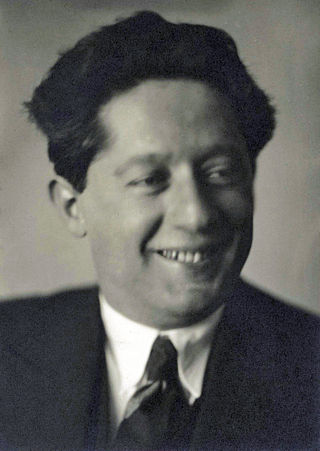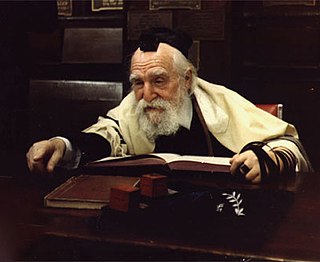Related Research Articles

The Mishnah or the Mishna is the first major written collection of the Jewish oral traditions that are known as the Oral Torah. It is also the first major work of rabbinic literature. The Mishnah was redacted by Judah ha-Nasi probably in Beit Shearim or Sepphoris between the ending of the second century and the beginning of the 3rd century CE in a time when, according to the Talmud, the persecution of Jews and the passage of time raised the possibility that the details of the oral traditions of the Pharisees from the Second Temple period would be forgotten.

Rabbinic literature, in its broadest sense, is the entire spectrum of rabbinic writings throughout Jewish history. However, the term often refers specifically to literature from the Talmudic era, as opposed to medieval and modern rabbinic writings, and thus corresponds with the Hebrew term Sifrut Chazal. This more specific sense of "Rabbinic literature"—referring to the Talmudim, Midrashim, and related writings, but hardly ever to later texts—is how the term is generally intended when used in contemporary academic writing. The terms mefareshim and parshanim (commentaries/commentators) almost always refer to later, post-Talmudic writers of rabbinic glosses on Biblical and Talmudic texts.

A yeshiva is a traditional Jewish educational institution focused on the study of Rabbinic literature, primarily the Talmud and halacha, while Torah and Jewish philosophy are studied in parallel. The studying is usually done through daily shiurim as well as in study pairs called chavrusas. Chavrusa-style learning is one of the unique features of the yeshiva.

Abraham Isaac Kook, known as Rav Kook, and also known by the acronym HaRaAYaH, was an Orthodox rabbi, and the first Ashkenazi Chief Rabbi of British Mandatory Palestine. He is considered to be one of the fathers of religious Zionism and is known for founding the Mercaz HaRav Yeshiva.

Saul Lieberman, also known as Rabbi Shaul Lieberman or, among some of his students, the Gra"sh, was a rabbi and a Talmudic scholar. He served as Professor of Talmud at the Jewish Theological Seminary of America (JTSA) for over 40 years, and for many years was dean of the Harry Fischel Institute in Israel and also president of the American Academy for Jewish Research.

The Soloveitchik dynasty of rabbinic scholars and their students originated the Brisker method of Talmudic study, which is embraced by their followers in the Brisk yeshivas. It is so called because of the Soloveitchiks' origin in the town of Brisk, or Brest-Litovsk, located in what is now Belarus. Many of the first Soloveitchik rabbis were the official rabbis of Brisk, and each in turn was known as "the Brisker Rov". Today, Brisk refers to several yeshivas in Israel and the United States founded by members of the Soloveitchik family, including: ‘Brisk Proper’(Now run by R’ Abraham Yehousua Soloveitchik),R’ Dovid’s, Tomo(Toras Moshe), and others.
Menachem ben Solomon HaMeiri, commonly referred to as HaMeiri, the Meiri, or just Meiri, was a famous medieval Provençal rabbi, and Talmudist. Though most of his expansive commentary, spanning 35 tractates of the Talmud, was not publicly available until the turn of the 19th century, it has since gained widespread renown and acceptance among Talmudic scholars.

Aggadah is the non-legalistic exegesis which appears in the classical rabbinic literature of Judaism, particularly the Talmud and Midrash. In general, Aggadah is a compendium of rabbinic texts that incorporates folklore, historical anecdotes, moral exhortations, and practical advice in various spheres, from business to medicine.

Shimon Yehuda Shkop was Rosh Yeshiva (dean) of the Yeshiva of Telshe, and later of Yeshiva Shaar HaTorah of Grodno. Having innovated a style of Torah study, applying both to Halacha and to Talmud, he was widely regarded as a major Talmid Chacham.
Yaakov ben Yaakov Moshe Lorberbaum of Lissa (1760-1832) was a rabbi and posek. He is most commonly known as the "Ba'al HaChavas Da'as" or "Ba'al HaNesivos" for his most well-known works, or as the "Lissa Rav" for the city in which he was Chief Rabbi.

Rabbi Yitzchok Yaakov Weiss, commonly known as the Minchas Yitzchak after the responsa he authored, was the rabbi of the Edah HaChareidis in Jerusalem at the time of his death, as well as a posek, and Talmudic scholar. His rulings on Jewish law (halacha) are frequently cited and relied upon by rabbinic courts and scholars.

Aryeh Leib Malin (1906–1962) was a Polish-born American Haredi Jewish rabbi, Talmudic scholar, and Mussarist who taught the Torah and spread rabbinical education in Europe, China, Japan, and the United States.

Moshe Feinstein was a Russia born American Orthodox Jewish rabbi, scholar, and posek. He has been called the most famous Orthodox Jewish legal authority of the twentieth century and his rulings are often referenced in contemporary rabbinic literature. Feinstein served as president of the Union of Orthodox Rabbis, Chairman of the Council of the Moetzes Gedolei HaTorah of the Agudath Israel of America, and head of Mesivtha Tifereth Jerusalem in New York.

Yechiel Yaakov Weinberg (1884–1966) was an Ashkenazi Orthodox rabbi, posek and rosh yeshiva. He is best known as the author of the work of responsa Seridei Eish.
Rav is the Hebrew generic term for a person who teaches Torah or is a Jewish spiritual guide or a rabbi. For example, Pirkei Avot states (1:6) that:
(..) Joshua ben Perachiah says, "Set up a teacher [RaB] for yourself. And get yourself a friend [HaBeR]. And give everybody the benefit of the doubt."
Avraham Eliezer Alperstein was an Orthodox Rabbi, Rosh yeshiva, publisher, communal leader and exceptional Talmudic scholar. He published the first ever section of Talmud in the United States.
In Jewish law, a posek is a legal scholar who determines the application of halakha, the Jewish religious laws derived from the written and Oral Torah in cases of Jewish law where previous authorities are inconclusive, or in those situations where no clear halakhic precedent exists.
Rabbi Charles Ber Chavel was a rabbi and scholar who, most notably, published critical editions of medieval Jewish commentators.
Melech Schachter was a pulpit rabbi, coordinator of Jewish divorce, and instructor at Yeshiva University for over fifty years.
Samson ben Samson of Coucy, known as the Count (or Prince) of Coucy, was a French rabbi and Tosafist who flourished at the end of the twelfth and in the first half of the thirteenth century..
References
- ↑ Samuel Tchernowitz
- 1 2 3 4 5 6 7 8 9 Why Did Einstein Promote the Talmud When He Couldn’t Read It?
- 1 2 Davar, "רב צעיר" על חייו ופעולתו, 14 June 1949
- ↑ חיים טשרנוביץ (1870־1949)
- 1 2 3 4 5 6 7 8 9 Jewish Virtual Library: Chaim Tchernowitz
- 1 2 Dr. Chaim Tchernowitz, Internationally-Known Talmudic Scholar, Dies at 78 in New York
- 1 2 3 YIVO | Tchernowitz, Ḥayim
- ↑ פרקים בהלכות אישות על פי התלמוד
- ↑ Micha Josef Berdyczewski, ספרי דת: א: לִלְמֹד וּלְהוֹרוֹת